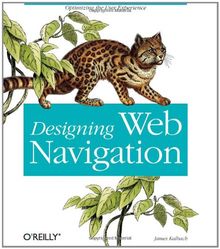
Thoroughly rewritten for today's web environment, this bestselling book offers a fresh look at a fundamental topic of web site development: navigation design. Amid all the changes to the Web in the past decade, and all the hype about Web 2.0 and various "rich" interactive technologies, the basic problems of creating a good web navigation system remain. Designing Web Navigation demonstrates that good navigation is not about technology-it's about the ways people find information, and how you guide them.
Ideal for beginning to intermediate web designers, managers, other non-designers, and web development pros looking for another perspective, Designing Web Navigation offers basic design principles, development techniques and practical advice, with real-world examples and essential concepts seamlessly folded in. How does your web site serve your business objectives? How does it meet a user's needs? You'll learn that navigation design touches most other aspects of web site development. This book:
* Provides the foundations of web navigation and offers a framework for navigation design
* Paints a broad picture of web navigation and basic human information behavior
* Demonstrates how navigation reflects brand and affects site credibility
* Helps you understand the problem you're trying to solve before you set out to design
* Thoroughly reviews the mechanisms and different types of navigation
* Explores "information scent" and "information shape"
* Explains "persuasive" architecture and other design concepts
* Covers special contexts, such as navigation design for web applications
* Includes an entire chapter on tagging
While Designing Web Navigation focuses on creating navigation systems for large, information-rich sites serving a business purpose, the principles and techniques in the book also apply to small sites. Well researched and cited, this book serves as an excellent reference on the topic, as well as a superb teaching guide. Each chapter ends with suggested reading and a set of questions that offer exercises for experiencing the concepts in action.